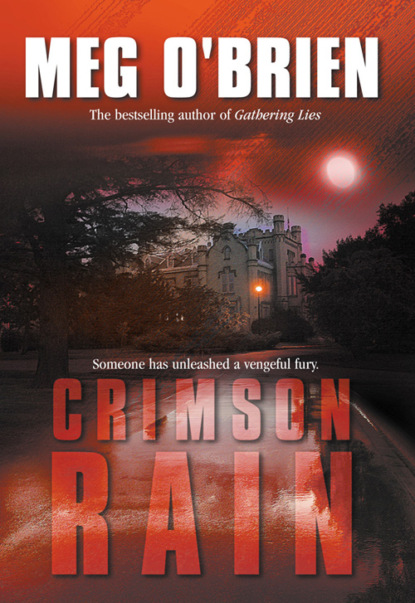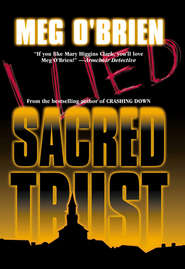По всем вопросам обращайтесь на: info@litportal.ru
(©) 2003-2025.
✖
Crimson Rain
Автор
Год написания книги
2018
Настройки чтения
Размер шрифта
Высота строк
Поля
Where had that easy companionship gone? Rachel had come home this time seeming sullen. Detached. Gina felt the loss like a shaft through her heart.
“Rachel, what’s wrong?” she said now. “You’ve changed somehow since summer.”
“And?”
“And I’m not sure I like all of it. Last night, at the airport, for instance—”
“Oh, for heaven’s sake, I was just tired. I didn’t mean to snap. And why didn’t Dad come? You said he was going to.”
“I thought he was. But I told you, honey, something came up.” Gina ran her fingers through her short-cropped brown hair, inadvertently messing up the style she’d worked at so carefully this morning.
“Came up? At Soleil?” Rachel rolled her eyes.
“Yes, at Soleil,” Gina said, annoyed. “Where else?”
Rachel shrugged and studied her toast, picking off tiny pieces and putting them in her mouth one at a time, chewing slowly. “Nowhere, I guess.”
Gina sighed. So far, this visit was not going at all well. “Rachel, if you’ve got something to say, please just say it.”
Her daughter slid off the stool and took her plate and coffee cup to the sink, grinding the rest of her toast in the disposal. With her back to Gina she said, “I just think there’s something wrong.”
“Like what?”
“I don’t know…like maybe Dad is sick, or something.”
“Is that what you think? That he’s sick?”
Rachel came back and slid onto the stool. Her eyes held a glint of anger. “Well, he’s not acting at all like himself. Haven’t you even noticed?”
“No, I haven’t.” Gina’s brow furrowed. “What would make you say that?”
Rachel shrugged again. “For one thing, he hasn’t been e-mailing me hardly at all this semester. One of my friends at school found out her father had cancer, and the only way she knew was that he stopped talking to her on the phone. He was too sick to call the way he always did.”
“Well, sweetheart, I can assure you that your father does not have cancer. He’s perfectly well, and when he gets down here you can ask him for yourself.”
“That’s another thing. Why is he sleeping so late?”
Gina gritted her teeth. This was worse than when her daughter was seven and asked so many questions that it drove her crazy, especially in the morning before she’d fully woken up.
“It’s only ten o’clock,” she said briskly, looking at her watch. “And speaking of time, we should be leaving soon if we want to beat at least some of the crowds.” She piled her coffee cup and silverware on top of her toast plate.
“Mom, you aren’t—”
“No, I’m not taking the blasted cane!” Gina took her dishes to the sink. “Now stop annoying me, Rachel, and go get dressed. Maybe you’ll meet your father on the stairs, and you can pester him for a while.”
She tempered her words with a smile and crossed over to her daughter, kissing her lightly on the cheek. Rachel gave her a half smile and slipped away, her ponytail bobbing behind her as she went through the door. A scene from childhood, Gina thought. Yet it’s not. It’s all wrong today.
Rinsing the dishes and putting them in the dishwasher, Gina gazed out on the back lawn. The skies over Seattle could be gray in winter, but the rain at least kept the grass and the cedar trees green. Unfortunately, the flower beds were all dead, except for a chrysanthemum here and there. Gina yearned for spring, like a sailor at sea too long yearns for land.
They were lucky, though, to have this beautiful home, and to have bought it before prices went sky-high. From the front, one could see the Space Needle, and the view of the Sound was exquisite. Even with the problems they’d had with Angela, she and Paul enjoyed a life that most would give their right arms for.
As for the problems, they were over now. In the past. They had finally reached that place they had talked about and looked forward to when they were younger—an early retirement, possibly travel, and an easing of the pressures of life.
Gina felt a wave of depression sweep over her, a feeling of being dead inside. Quickly she shook it off and went to get ready to leave. She and Rachel would stop at a drive-through espresso stand along the way to the stores. Another jolt of caffeine, that’s all she needed. She and millions of other Washingtonians—victims of the barometer, and addicts all.
Paul stood at his bathroom mirror, taking in the lines of strain that had appeared around his eyes since Rachel had come home. He had seen her only briefly, arriving home himself at ten—early, for a change—just as Gina and Rachel had pulled into the driveway themselves. That had meant leaving Lacey’s apartment early, and now he felt bad that he’d gone there at all, instead of helping Gina pick up Rachel. He had told himself he would stay only an hour or so, and that Gina would be fine going to the airport alone. He would meet them at the restaurant.
But that had all flown out the window once he was with Lacey. The lines of strain deepened. He felt torn between his daughter and his mistress, and weak because he hadn’t chosen well.
What he didn’t understand was why Rachel was so different this time. During her visits home in her freshman year, she had been the young woman he’d always known. Now she looked at him with eyes that seemed to cut right through him. It was as if she had the ability to reach inside his soul and pull all his secrets out.
Though he felt ashamed to even think this way, it almost made him not want to be around her.
Bracing himself to walk into the kitchen, Paul planted a smile on his face. Rachel was there, talking on the phone, and he crossed over to her, kissing her on the cheek.
“It’s great to have you home,” he said when she hung up. He hugged her.
“Is it?” She pulled back and looked up at him, her eyes narrowing. “You know, Dad, I saw a show on TV at school, called ‘The Human Face.’ John Cleese—you know, that guy who used to be on Monty Python?—he showed how when the muscles around the mouth don’t go up and the ones around the eyes don’t widen, a smile is a fake.”
He stared at her, nonplussed. “What are you saying?”
“That I don’t know whether to believe you when you say you’re glad to have me home.”
“Of course I am, honey!” he insisted. “You know that!”
“Then why didn’t you come to the restaurant last night?”
He flinched at her cold tone. “I’m sorry, Rach. I meant to, but things came up.”
She turned and busied herself at the fridge, taking out a bottle of water.
“What things came up, Daddy?” she asked, twisting the cap off the bottle with a loud snap.
It was almost as if she were making a double entendre of a sexual nature, Paul thought with a start. What things came “up?” But he couldn’t believe Rachel capable of that. Even if she knew anything about his being with Lacey last night—which was impossible—she would never say something like that.
There was something about Rachel this time, though, that made him feel uncomfortable, off balance.
He poured himself a full cup of steaming coffee and changed the subject. “How was school this semester?”
“You want to see my report card?” she answered.
“Well, of course I’m always interested in that, but I didn’t mean—”
“Because my grades are okay,” she interrupted, “if that’s what you’re worried about.”
“Rachel…” He sighed as she leaned against the refrigerator and glared at him. “What is it? What’s wrong?”
“Why don’t you tell me?” she said.









